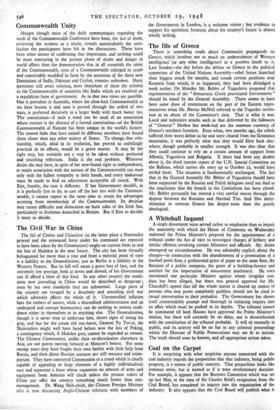Commonwealth Unity
Meagre though most of the daily communiqués regarding the work of the Commonwealth Conference have been, the last of them, reviewing the sessions as a whole, reveals unmistakably the satis- faction the participants have felt in the discussions. There have been other means of confirming that impression, and nothing could be more reassuring in the present phase of doubt and danger in world affairs than the demonstration that in all essentials the unity if the Commonwealth, even of a Commonwealth enlarged in scope and conceivably modified in form by the accession of the three new Dominions of India, Pakistan and Ceylon, remains unbroken. Many questions still await solution, most important of them the relation to the Commonwealth of countries like India which are resolved on a republican form of government. As to that two views are possible. One is prevalent in Australia, where the close-knit Commonwealth as we have known it and seen it proved through the ordeal of two wars, is preferred decisively to a larger body with much looser ties. The constitution—if such a word can be used of an association whose essence is the absence of a formal constitution—of the British Commonwealth of Nations has been unique in the world's history. The unseen links that have united its different members have bound them closer than any other society of States. To change. that rela- tionship, which, ideal in its evolution; has proved so unfailingly practical in its effects, would be a grave matter. It may be the right step, but certainly not a step to be taken without profound and searching reflection. India is the real problem. Whatever desire she may have, in spite of her new-found right to independence, to retain association with the nations of the Commonwealth can meet only with the fullest sympathy at their hands, and every, endeavour must be made to find an adjustment acceptable all round. With Eire,. frankly, the case is different. If her Government decides, as it is perfectly free to do, to cast off the last ties with the Common- wealth, it cannot expect at the same time to retain the advantages accruing from membership of the Commonwealth. Its decision may create difficulty and dislocation on both sides of the Irish Sea, particularly to Irishmen domiciled in Britain. But if Eire so decides it must so decide.


































 Previous page
Previous page